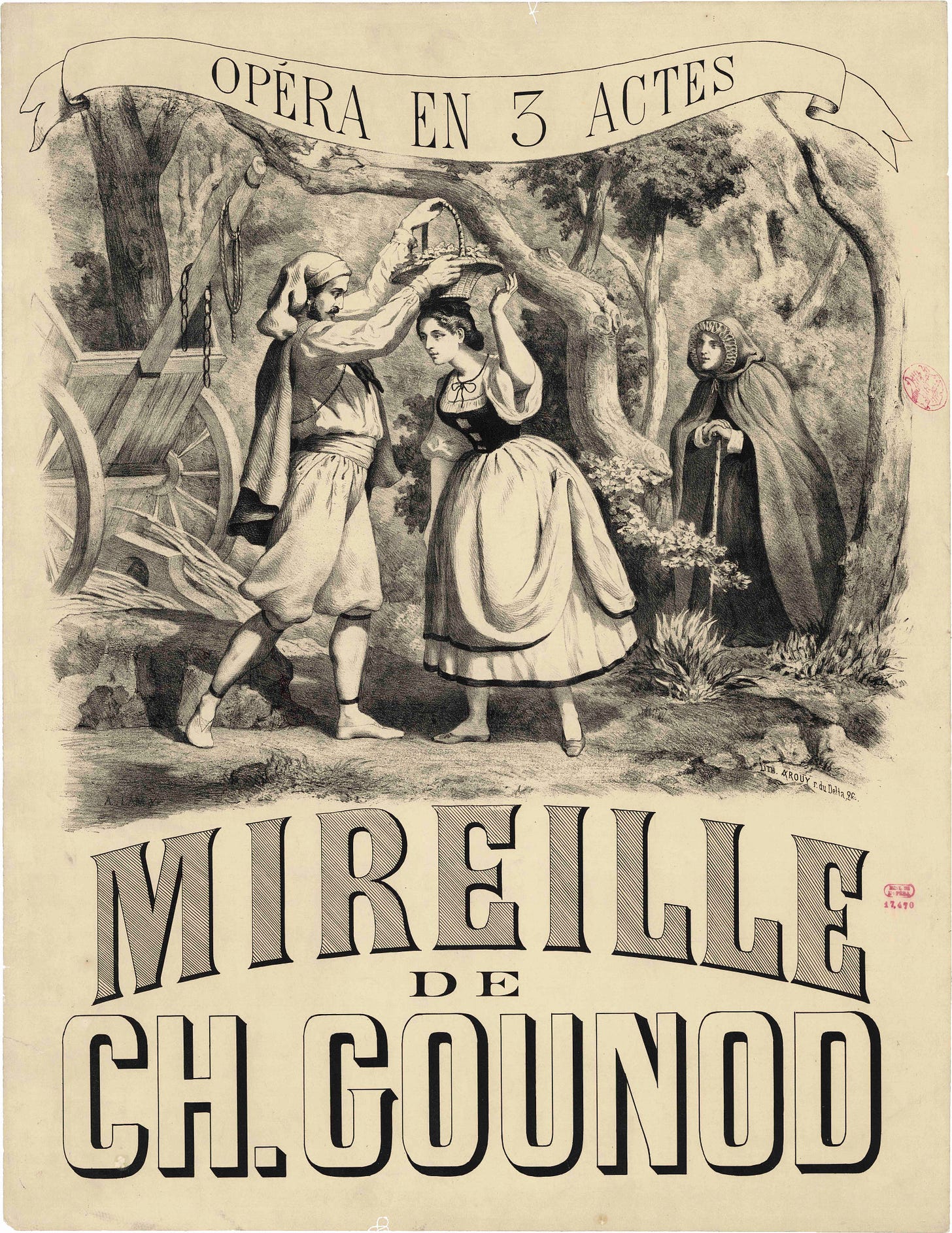Opera Daily 🎶 — Gounod’s "O légère hirondelle"
This week's Opera Daily features “O légère hirondelle,” a soprano aria from Act 3 of the French opera Mireille by Charles Gounod.
👋 Hello to the new Opera Daily subscribers who have joined us this week. I hope you’re sitting on a comfortable couch with a warm beverage and enjoying your weekend. You can check out the complete Opera Daily archives and the playlist on YouTube for more selections. If you were forwarded this email by a friend, join us by subscribing here:
Today we’re listening to…
“O légère hirondelle,” a soprano aria from Act 3 of the French opera Mireille by Charles Gounod.
🌟 Spotlight on composer Charles Gounod: Known primarily for Faust and Romeo and Juliet, Gounod’s genius extends far beyond these masterpieces. His romantic melodies and gift for orchestration shine brightly in his lesser-known works. Mireille is one such opera, with its Provençal setting and love story that is beautifully captured in its melodies.
In "O légère hirondelle," the lead character, Mireille, sings to a swallow, wishing she too could follow her beloved Vincent. The aria is lyrical, filled with longing, and captures the essence of youthful, passionate love.
When it comes to Gounod, Fleming’s interpretation stands out for its delicacy and nuance. Every note she sings in "O légère hirondelle" vividly depicts Mireille's youthful optimism and love for Vincent.
🎧 Treat Your Ears (3 minute listen): Soprano Renée Fleming singing "O légère hirondelle" from Charles Gounod’s Mireille.
A Glimpse into Mireille:
Premiere: Paris, March 19, 1864.
Gounod's Grace: Charles Gounod had a talent for crafting melodies that tug at the heartstrings. Mireille may not have the same widespread fame as Faust, but it showcases Gounod’s strengths just as potently.
Inspiration: The opera's story is based on a Provençal poem by Frédéric Mistral. It tells the tale of Mireille, a farmer's daughter, and her love for Vincent, a poor basket-maker.
Before the Spotlight Shines: Mireille, in love with Vincent, faces opposition from her own family. In "O légère hirondelle," her feelings of love, pain, and longing are beautifully expressed as she sings to a passing swallow.
Gounod's Legacy: While operas like Faust and Romeo and Juliet solidified Gounod's place in the operatic world, pieces like Mireille remind us of the depth and variety of his talents. Exploring his lesser-known works offers a deeper understanding and appreciation of his musical genius.
Grateful for your time and ears,
Michele
PS. Missed our last edition? We featured “Mira, o Norma,” a duet from the Italian opera Norma by Vincenzo Bellini.
An ask: If you liked this piece, I’d be grateful if you’d consider tapping the ❤️ in the header above. This helps me understand which pieces you like most, and what we should do more of. Thank you!



One of the things that most impresses me in vocal writing is how composers of operatic works really stretch the envelope of what's possible, or normal, for a human voice. Besides the kinds of stratospheric extremes (Offenbach's Hoffmann comes easily to mind, or Strauss' Ariadne) it's this kind of writing I have in mind. Yes, I know that opera is not written for normal people to sing but for those gods and goddesses among us with the instruments capable of doing this kind of singing, but that composers even think to write music like this amazes me. And then for the singers to make music of it? After Krol Roger now I've another opera to go find.
Are there any important little known Gounod opera's ? Has The Met ever staged anything besides FAUST or R&J ?